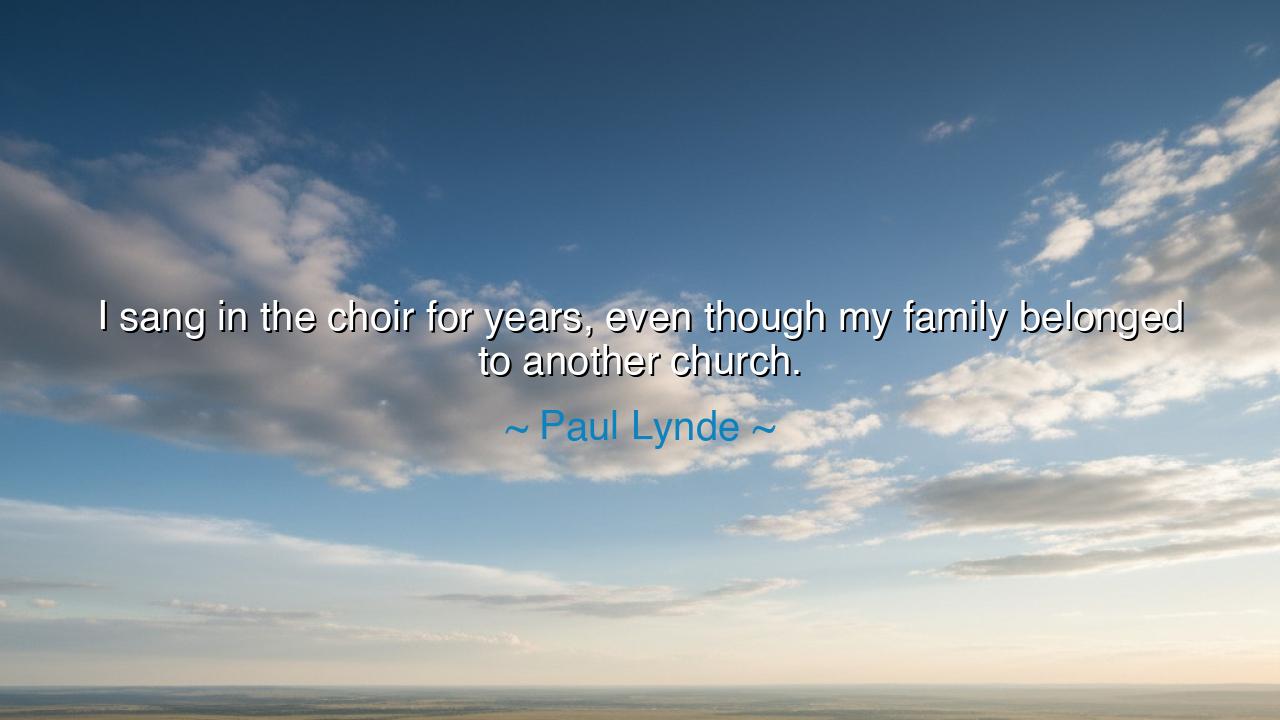
I sang in the choir for years, even though my family belonged to






In the words of Paul Lynde, “I sang in the choir for years, even though my family belonged to another church.” This seemingly lighthearted statement carries a deeper truth about the nature of individuality and belonging. Lynde's choice to participate in the choir of a different church than his family belonged to speaks not only to a personal desire to engage with the beauty of music but also to a willingness to forge one's own path, even when it stands apart from the traditions or expectations of the family or community. This is a story of courage—the courage to pursue one's own calling, even if it requires stepping beyond the familiar and the accepted.
In the ancient world, individuals were often bound by the traditions of their families and tribes. The great philosophers of Greece, such as Socrates and Plato, often wrestled with the tension between the individual and the society. Socrates, for instance, was famously put on trial for corrupting the youth, for encouraging them to think for themselves, to question the accepted norms of their society. In his defense, Socrates spoke not only of his personal mission to seek truth, but of the importance of standing firm in one’s beliefs, even in the face of community opposition. Lynde’s decision to sing in a different choir than his family’s church mirrors this ancient tension—the decision to follow one’s passion and truth, even when it diverges from the expected path.
Consider the example of Diogenes, the ancient Greek philosopher who rejected societal norms and conventions in favor of an ascetic life devoted to self-sufficiency and the pursuit of wisdom. Diogenes, much like Lynde, lived outside the traditional constraints of his time. He famously lived in a barrel and carried a lamp in daylight, declaring that he was looking for an honest man. His actions, while extreme, were driven by a profound commitment to authenticity and individuality, refusing to bow to the expectations of the world around him. Lynde’s act of singing in a choir, despite his family’s membership in a different church, can be seen as a more modest, but equally powerful, assertion of personal freedom and expression.
In this, we are reminded that the quest for personal fulfillment often requires us to step outside the lines of our heritage and culture. Lynde's choice to sing in a choir apart from his family is symbolic of the age-old struggle between tradition and individual desire. It is not a rejection of one's roots, but a reaffirmation of the individual's right to follow their own passions, to contribute to a community not necessarily of their own making, and to find purpose in unexpected places. This journey is not without its challenges, as tradition often has a stronghold on the heart, but the true wisdom lies in recognizing that the soul's calling often transcends the bounds of familial or societal expectations.
King David of the Bible provides us with a powerful historical example of someone who acted independently of traditional expectations in pursuit of his own calling. Though born the youngest son of Jesse, a humble shepherd, David chose to fight Goliath, a decision that set him on a path of destiny, despite the skepticism of his family and even the king. David’s independence—his willingness to step outside the norm, to challenge what was expected of him—was a defining characteristic of his character. Like Lynde, David was not content to follow the path others laid before him; he followed his heart, his calling, and in doing so, changed the course of history.
The lesson in Lynde’s words is a timeless one: the individual must listen to their inner voice, even when it leads them on a path divergent from the expectations of those around them. Whether it is in the pursuit of creativity, spirituality, or any other aspect of life, we must not allow the tethers of tradition to limit our expression or our growth. Lynde's choice to sing in a choir outside of his family’s church shows us that personal fulfillment often comes when we are willing to step beyond the boundaries set by others and forge our own way.
In your own life, consider how you might live with more authenticity and purpose. Are there areas where you feel your true self is constrained by the expectations of others? Like Lynde and David, you may need to take courageous steps to follow your own path, even if it leads you outside the comfort zone of your community or family. By doing so, you will not only fulfill your own potential but also inspire others to do the same—to embrace their individuality, to sing their own song, and to live a life that reflects their deepest truths.






AAdministratorAdministrator
Welcome, honored guests. Please leave a comment, we will respond soon